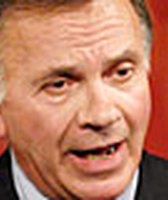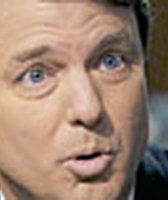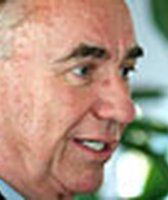Stand up for the facts!
Our only agenda is to publish the truth so you can be an informed participant in democracy.
We need your help.
I would like to contribute
SUMMARY: Former President Bill Clinton cites international polls and New York precinct reports to say Sen. Hillary Clinton can win the presidency. His facts are right, but his conclusion is another matter.
In speeches and interviews, Clinton has filled the traditional role of the campaign spouse, telling funny stories about his wife and highlighting her qualifications to be the nation's top executive. Lately, however, he's also been trying to mitigate a perception that continues to dog Sen. Clinton, that she's too polarizing to win a national election.
On the campaign trail, the former president has cited a favorable but not terribly meaningful poll showing that 30 percent to 40 percent of Europeans and Canadians favor a Hillary Clinton presidency. It is evidence, he says, that her candidacy has worldwide appeal.
He's also been trafficking in data from her decisive 2006 reelection to the Senate to sell the idea that she can win nationwide.
"In New York, when she ran for reelection, she carried 58 of our 62 counties. George Bush had won 40 counties in New York just two years earlier," Mr. Clinton told Larry King recently.
The international poll and her strong reelection numbers sound pretty good. But do they mean anything in an American presidential race?
Not really, the experts say.
Mario Canseco, director of global studies at Angus Reid Strategies, the Canadian firm that conducted the poll, attributed Mrs. Clinton's solid support in Britain, Germany, France, Italy and Canada mainly to name recognition as a consequence of her role as First Lady.
"We expected Hillary to come out on top — she is well-known, she traveled extensively as a First Lady, and Europe retains a fascination with the presidency of Bill Clinton," Canseco said. That's been particularly true since the Bush administration clashed with the French and German governments over the war in Iraq.
Carl Sferrazza Anthony, the author of several books on first ladies and the consulting historian for the National First Ladies Library in Canton, Ohio, declared Clinton "the most traveled First Lady in history."
While many of her trips were virtually ignored by the U.S. media, the international press covered them heavily, and she earned kudos abroad for her support of micro loans, women's rights, healthcare, democracy and other issues, Anthony said.
"She was not going around playing the American queen to be entertained at parties by majarajas and premiers and kings," he said. "She was there really to work."
Still, roughly four in 10 of those polled by Angus Reid were undecided about who they'd prefer to inhabit the White House. "At this early stage of the campaign, the media in Europe is not yet paying attention to the U.S. presidential race," he said.
Karlyn Bowman, a senior fellow at the American Enterprise Institute who researches public opinion, the European and Canadian poll is essentially measuring name recognition.
"Hillary is known by virtually everyone in the U.S. and pretty well known abroad," she said. "And it's not surprising that someone with a name like Giuliani does pretty well in Italy."
As for the former president's claims about his wife's strong performance in areas of New York that had gone for Bush, a Republican, in 2004, he's right: In 2006, she won 90 percent of the counties Bush won, and she made headway in Republican areas of Long Island and Upstate New York. She also gained 18 percentage points among Independents between her first election in 2000 to 2006.
But experts says it's important to note that 2006 was a Democratic year, as the party regained control of both the U.S. House and the U.S. Senate. "The national tide raised the boats of Democrats all over the country," said Joe Lenski, executive vice president of Edison Media Research.
He also cited the value of the incumbency in winning reelection, "and the fact that certain groups that were skeptical of her in 2000 –- independents, Upstate voters and suburban voters -- were less skeptical after seeing her perform for one term."
Lee Miringoff, director of the Marist Poll, said the lesson isn't that Mrs. Clinton would be potent in Republican-leaning communities nationwide, but rather that she was effective at changing negative attitudes about her in New York, thanks to aggressive campaigning and hard work as a senator.
Democrats also were far more motivated to vote in 2006 than Republicans, he noted.
"Sure it's good to do well in places where Democrats might not typically do well," Miringoff said, "but it's a little bit of a reach to make that jump to 'Ohio is next.'"
Our Sources
Center for the Study of the American Electorate, , Bush, Iraq Propel Modest Turnout Increase Ending 12-Year Republican Revolution: Dems Higher Than Gop For First Time Since 1990,
November 9, 2006 New York State Board of Elections, New York Election Results November 7, 2006
Voter News Service, November 2000 exit poll.
Edison Media Research and Mitofsky International, 2006 voter exit poll
Interview with Maurice "Mickey" Carroll, director of the Polling Institute, Quinnipiac University
Interview with Karlyn Bowman, senior fellow at the American Enterprise Institute
E-mail Interview with Mario Canseco, director of global studies, Angus Reid Strategies
Interview with Carl Sferrazza Anthony, author of several books on the first ladies, and consulting historian with the National First Ladies Library
Interview with Dr. Michael McDonald, associate professor of public and international affairs, George Mason University.
Interview with Joe Lenski, executive vice president of Edison Media Research































